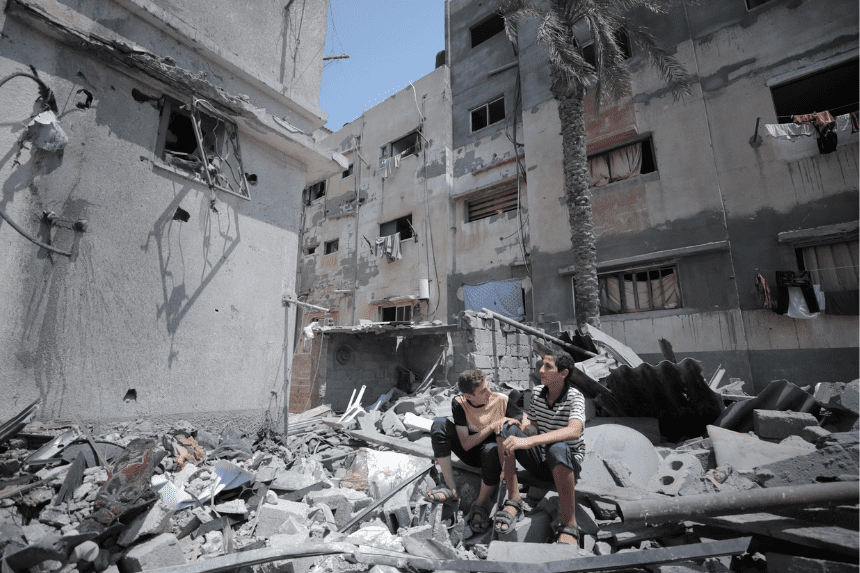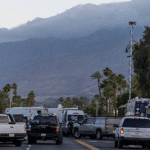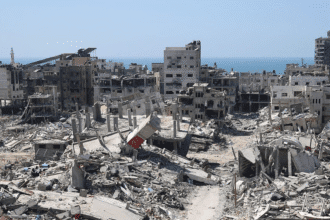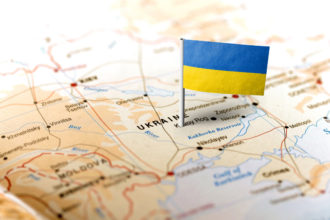Together, the United Kingdom, France, and Canada have issued a rare united statement warning Israel against its growing military campaign in Gaza. The declaration emphasizes the developing humanitarian situation in Gaza and demands an instant ceasefire from hostilities.
- How has Israel responded to the Western requests?
- What is the Gaza humanitarian situation?
- What ignited the Gaza Conflict?
- What responsibilities does Hamas have?
- Does support exist for a long-term peace proposal?
- How Might the Humanitarian Crisis in Gaza Be Resolved?
- What Can People and Companies Do?
- Last Words
The joint appeal states Israel must stop its offensive activities and let unhindered humanitarian relief enter the land. The leaders underlined the serious shortages of food, gasoline, and medical supplies resulting from the present embargo in place since March 2.
This strong worldwide posture captures growing concern over civilian suffering in the area. Sir Keir Starmer of the UK, Emmanuel Macron of France, and Mark Carney of Canada have each urged a quick response to prevent an even more severe humanitarian disaster.
How has Israel responded to the Western requests?
Benjamin Netanyahu, Israeli prime minister, answered quickly and forcefully. He attacked the combined statement, saying it compromises Israel’s security and sends the incorrect message to Hamas.
“The leaders in London, Ottawa, and Paris are offering a huge prize for the genocidal attack on October 7, by asking Israel to end a defensive war for our survival before Hamas is dismantled,” Netanyahu stated.
He also urged other European leaders to follow what he described as “Trump’s vision” for the Middle East rather than demands for a ceasefire. This relates to the strategy of the previous American government, which was generally regarded as supporting Israel’s security issues over Palestinian statehood.
What is the Gaza humanitarian situation?
Gaza is suffering a grave humanitarian crisis. Not one truck delivering food, medication, or gasoline has been let into the area since the blockade started more than two months ago. Widespread hunger, crumbling healthcare, and mounting citizen desperation have followed from this.
Western leaders said this was insufficient, even if Israel had declared it would let a “basic amount” of food into Gaza.
Said another way: “The denial of essential humanitarian assistance to the civilian population is unacceptable and risks breaching International Humanitarian Law.”
UN humanitarian chief Tom Fletcher reflected these feelings. “The drop in the ocean of desperately needed aid trucks cleared to enter,” he remarked.
Every day, the humanitarian situation in Gaza gets worse. There are shortages in hospitals. There is little water. Families are hiding amid ruins devoid of even the most fundamental needs. Read another article on Kamala Harris condemns Gaza school airstrike
What ignited the Gaza Conflict?
The attack on southern Israel conducted by Hamas on October 7, 202,3, set off the conflict. The single worst attack on the nation in decades claimed over 1,200 Israelis dead and kidnapped more than 250 others.
Israel has since started a full-scale military campaign targeted at eradicating Hamas’s capabilities. Israeli troops have thus advanced over much of Gaza, causing notable destruction.
Run by Hamas, Gaza’s health ministry claims that since the campaign started, over 53,000 Palestinians have perished. Thousands of women and children make up this count; many of them were caught in besieged locations.
Although it is difficult to independently confirm the numbers, they show the shockingly large scope of the Gaza humanitarian catastrophe.
What responsibilities does Hamas have?
The Western declaration was not aimed at Israel by itself. The UK, France, and Canada also urged Hamas to instantly and without conditions release all hostages still held in Gaza.
Of the almost 250 persons first captured, just 23 are verified to be alive, and 58 are still in captivity. The leaders called the abduction and ongoing captivity of hostages “heinous” and declared that it has to stop right away.
De-escalating tensions and creating avenues for next conversations depend on ending hostage detention.
Does support exist for a long-term peace proposal?
The Western leaders reaffirmed their support for a two-state solution, a long-standing international objective aiming at an independent Palestinian state coexisting peacefully alongside Israel.
Netanyahu fiercely rejected the idea, even with support from other countries. Establishing a Palestinian state under present circumstances, he said, would encourage terrorists and compromise Israel’s security.
Still, mounting appeals for diplomacy point to a possible change in world opinion. Many nations today view the humanitarian catastrophe in Gaza as a long-term danger to regional stability rather than only a transient disaster.
How Might the Humanitarian Crisis in Gaza Be Resolved?
Crisis solving calls much more than just political pronouncements. Opening humanitarian corridors, granting aid organizations complete access, and guaranteeing citizens get food, water, and medical treatment need immediate actions.
International pressure must be coordinated. Nations have to demand an instantaneous ceasefire and hold all people responsible under international law. Furthermore, diplomatic initiatives ought to concentrate on long-term solutions—not only on fleeting cease-fires but also on a lasting peace framework.
Until the world acts together and deliberately, the humanitarian situation in Gaza won’t go away. Every delay causes more loss, more suffering, and a more protracted road to recovery.
What Can People and Companies Do?
Additionally important roles are played by citizens, businesses, and advocacy groups. One can aid by means of public awareness campaigns, humanitarian donations, and nonviolent advocacy activities. Supporting reliable non-governmental organizations operating in Gaza guarantees that relief gets to people most in need.
Strong instruments for transformation are dialogue, understanding promotion, and urging of political leaders to give human rights top priority. Governments discuss policy; meanwhile, the voice of the people worldwide can change the direction of momentum toward compassion and peace.
Last Words
A worldwide moral test is the humanitarian disaster Gaza conflict. Families are suffering, innocent lives are lost, and the next generations are in danger.
Silence is not an option, as the combined call from the UK, France, and Canada makes quite plain. It is time for forceful, well-coordinated, compassionate action to preserve life and provide the basis for enduring peace.








